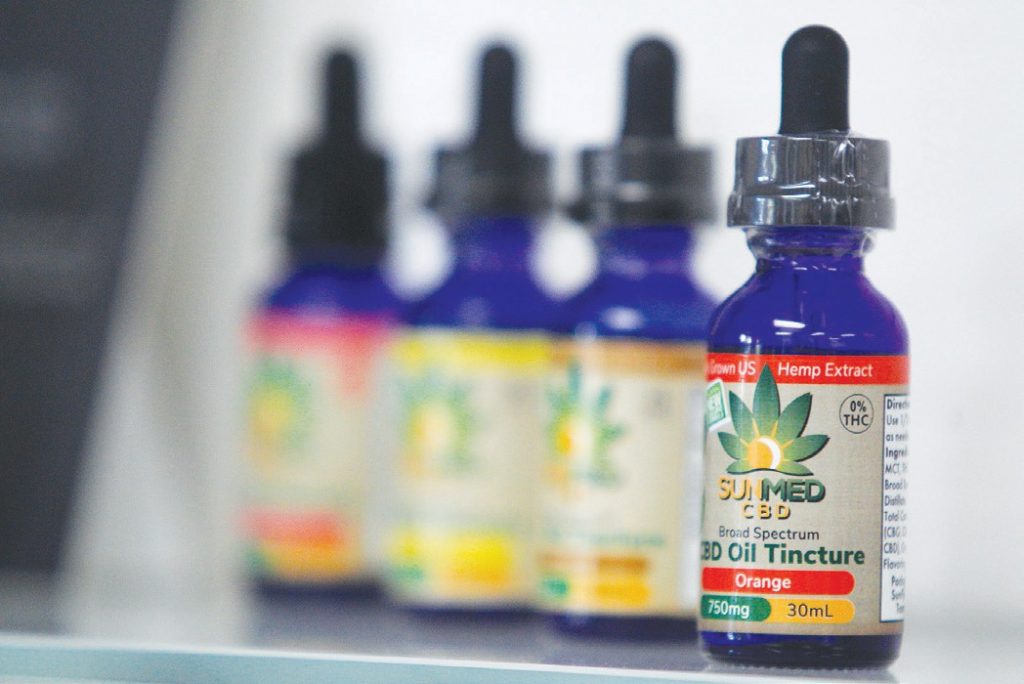
After suffering a concussion in January, Thousand Oaks resident Christine Robert turned to cannabidiol, a cannabis derivative, to help her heal. She had seen research that looked promising, and use of the drug produced the results she was looking for.
But on a recent trip to Lassens natural food store in T.O. to buy the CBD supplements she’d been taking the last three months, she found the product had been removed from the shelves.
She was shocked.
“I noticed the shelf was empty and I did a double take, like, where’d they all go?’” Robert said. “I talked to one of the employees who told me they couldn’t sell (CBD) anymore.”
Robert isn’t alone in her disbelief. CBD users across the state could lose easy access to the products they rely on for a host of ailments, including pain, anxiety and epilepsy, if the law isn’t changed.
But isn’t CBD legal?
Although California voters legalized cannabis in 2016, the law is full of complexities, chief among them being its handling of CBD. Most CBD products are derived from hemp, a type of cannabis with trace levels of THC, the psychoactive ingredient in marijuana.
California excluded industrial hemp from Prop. 64, so the state views CBD derived from it as illegal.
The 2018 federal Farm Bill, which was passed in December, further muddied the waters. The bill removed hemp from a list of controlled substances, making it legal for agricultural uses. What it didn’t legalize was hemp’s use in health supplements.
A representative from the California Department of Public Health said the state adheres to U.S. Food and Drug Administration regulations, which considers CBD, whether from cannabis or hemp, an unapproved substance.
As a result, CBD products can only legally be made from cannabis, and sold via a licensed cannabis retailer, not at grocery or health food stores, which is why Lassens was told to remove the product from its shelves.
California law supersedes federal regulation where cannabis is concerned, but the state doesn’t legally view hemp as cannabis, even though the two plants are in the same family.
Further confusing the issue is hemp’s legal use as a food product, namely hemp seeds and hemp-seed oil. Neither product contains cannabidiol, making it legal to sell them.
Shut it down
Doug Beach, manager of administrative and community services for the Ventura County environmental health division, said the department doesn’t have a list of hemp-derived CBD vendors to shut down. The Lassens in Thousand Oaks, where Robert bought her supplements, was prohibited from selling CBD after a routine inspection.
“We’ve been alerting our inspectors that if they see cannabis or hemp products, they need to check it out and see if it’s legal,” Beach said. “We’re not on a mission to find these stores and put them out of business. Health foods stores have all kinds of products. We’re in there all the time, so (if we find CBD) we alert the manager and ask if they realize they’re selling something that may not be legal.”
Beach said if his department receives a complaint, it’s obliged to investigate. If a store is found in violation of the law, the department issues an alert, but there are no immediate penalties. If the business continues to disregard the law, the county could issue notices of violation and the store would have to pay penalties.
Growing business
In recent months, stores selling only CBD products have popped up around the county. None of them have a cannabis retail license.
The operator of one of these stores, who asked to remain anonymous, said opening a CBD business was like opening any other retail store—there was no regulation requiring approval from a government agency such as the health department.
The owner told the Acorn they’re concerned about the legality of their business but don’t intend to go anywhere.
“Until I’m told I can’t be doing this, I’m here for the community. We have a lot of people who rely on our products, and I don’t want to let them down,” the business owner said. “I attribute CBD to helping me in a lot of ways, and there are lots of people who feel the same.”
CBD as medicine
There’s no shortage of claims about the health benefits of CBD, such as its effect on anxiety and inflamed muscles and its use as a treatment for seizures or psychotic episodes. However, the United States has little humantested research to back up all the talk. Most American research has been conducted in universities, and much of that on animals or on a cellular level.
Proponents are looking outside the country for evidence of its efficacy. In Israel, the government has been sponsoring THC and CBD research for years, which has yielded numerous studies about its health benefits.
The FDA recently approved CBD for use in a prescription drug, Epidiolex, which is used to treat seizures. As an FDAapproved pharmaceutical ingredient, CBD cannot be used in food or cosmetics, according to the federal government.
Clarity on the horizon
A bill making its way through the state Legislature may save the state’s burgeoning CBD industry.
Assembly Bill 228 was introduced by Assemblymember Cecilia Aguiar-Curry (D-Davis). If the bill is adopted, it will legalize hemp-derived CBD as a supplement that can be added to food, beverages and cosmetics.
Hemp CBD-infused products are considered “adulterated,” which existing legislation defines as “containing any poisonous or deleterious substance that may render it injurious to health of man or any other animal that may consume it.”
If AB 228 becomes law, hempderived CBD would no longer be considered an adulterant in California; the bill would make industrial hemp products subject to the state’s Medicinal and Adult-use Cannabis Regulation and Safety Act.
The Assembly bill, which was introduced on Jan. 17, is being reviewed.